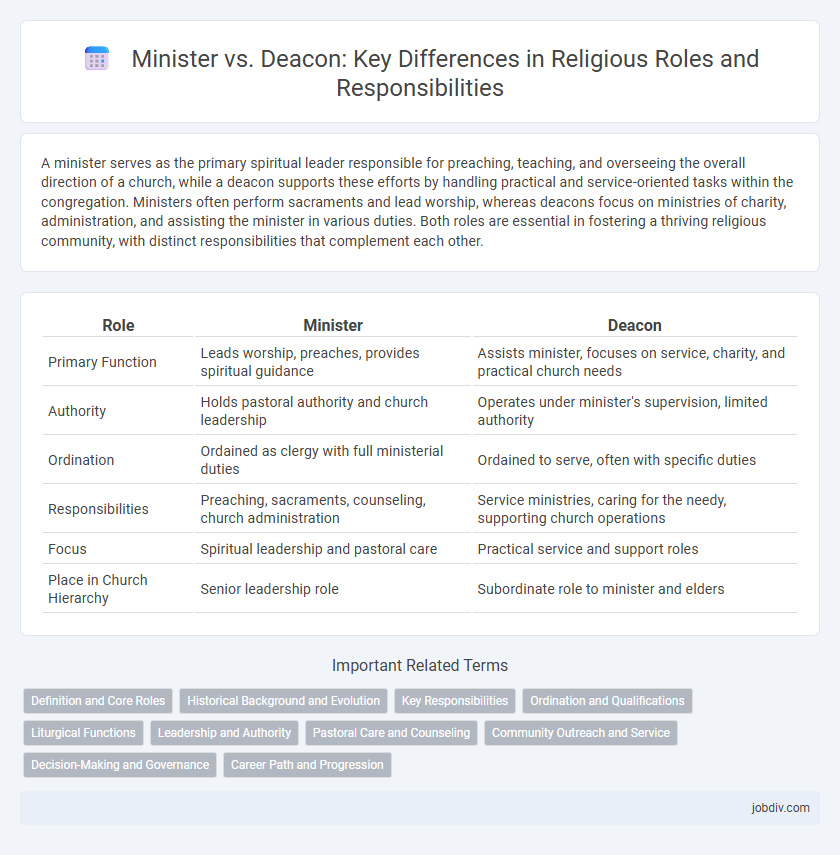A minister serves as the primary spiritual leader responsible for preaching, teaching, and overseeing the overall direction of a church, while a deacon supports these efforts by handling practical and service-oriented tasks within the congregation. Ministers often perform sacraments and lead worship, whereas deacons focus on ministries of charity, administration, and assisting the minister in various duties. Both roles are essential in fostering a thriving religious community, with distinct responsibilities that complement each other.
Table of Comparison
| Role | Minister | Deacon |
|---|---|---|
| Primary Function | Leads worship, preaches, provides spiritual guidance | Assists minister, focuses on service, charity, and practical church needs |
| Authority | Holds pastoral authority and church leadership | Operates under minister's supervision, limited authority |
| Ordination | Ordained as clergy with full ministerial duties | Ordained to serve, often with specific duties |
| Responsibilities | Preaching, sacraments, counseling, church administration | Service ministries, caring for the needy, supporting church operations |
| Focus | Spiritual leadership and pastoral care | Practical service and support roles |
| Place in Church Hierarchy | Senior leadership role | Subordinate role to minister and elders |
Definition and Core Roles
A minister is typically ordained clergy responsible for leading worship services, preaching sermons, administering sacraments, and providing pastoral care to the congregation. A deacon serves as an ordained servant focusing on ministry of charity, assisting in liturgical functions, and supporting the administrative and outreach activities within the church. Both roles are foundational in church leadership, with ministers emphasizing spiritual guidance and deacons emphasizing service and support.
Historical Background and Evolution
Ministers and deacons have distinct historical roots within Christian ecclesiastical structures, with ministers evolving primarily from early church presbyters responsible for spiritual leadership and preaching. Deacons originated as servants appointed in the early church to manage charitable activities and assist with logistical needs, as described in Acts 6. Over centuries, the roles diverged, with ministers increasingly emphasizing doctrinal teaching and pastoral care, while deacons maintained a focus on service and administrative support within church communities.
Key Responsibilities
Ministers primarily lead worship services, preach sermons, and provide spiritual guidance to the congregation, focusing on pastoral care and church administration. Deacons assist the minister by supporting charitable activities, managing church resources, and attending to the practical needs of the community, often serving as a bridge between the clergy and congregation. The distinct roles highlight ministers as spiritual leaders, while deacons emphasize service and operational support within the church.
Ordination and Qualifications
Ordination for ministers typically requires formal theological education and a comprehensive examination of doctrine, while deacons often undergo specific training focused on service and support within the church. Ministers must demonstrate leadership abilities, doctrinal soundness, and a calling to preach, whereas deacons are qualified through a commitment to charitable works, humility, and assisting pastoral duties. Both roles demand spiritual maturity and adherence to scriptural qualifications outlined in 1 Timothy 3 and Titus 1.
Liturgical Functions
Ministers lead congregational worship, administer sacraments, and deliver sermons, serving as primary officiants in liturgical ceremonies. Deacons assist ministers by preparing the altar, reading scriptures, and distributing communion, acting as facilitators within the service. Both roles contribute uniquely to the liturgical structure, with ministers holding authoritative functions and deacons providing essential support.
Leadership and Authority
Ministers typically hold a higher level of leadership authority within religious organizations, often responsible for preaching, administering sacraments, and guiding the congregation's spiritual direction. Deacons function primarily as servant-leaders, supporting the minister by managing practical and charitable duties, such as assisting with worship services and community outreach. While ministers embody spiritual leadership and decision-making authority, deacons play a vital role in operational support and fostering service-oriented ministry.
Pastoral Care and Counseling
Ministers provide comprehensive pastoral care and counseling, addressing spiritual, emotional, and relational needs within the congregation, often leading worship and administering sacraments. Deacons primarily support ministers by offering practical assistance and engaging in community outreach, focusing on serving the marginalized and facilitating care rather than direct counseling. Both roles collaborate to promote holistic well-being, but ministers typically hold the primary responsibility for pastoral counseling and spiritual guidance.
Community Outreach and Service
Ministers typically lead community outreach initiatives by organizing programs that address social, spiritual, and emotional needs, guiding congregational involvement. Deacons often serve as key facilitators in service activities, managing logistical support, distributing aid, and maintaining direct contact with community members. Both roles complement each other to strengthen the church's mission in community service and engagement.
Decision-Making and Governance
Ministers hold primary leadership roles in church decision-making and governance, often responsible for setting vision, doctrine, and managing congregational affairs. Deacons assist by handling administrative duties, supporting ministry programs, and addressing practical needs within the church community. The governance structure typically places ministers as key decision-makers, with deacons providing advisory input and executing policies under ministerial direction.
Career Path and Progression
A minister typically follows a career path involving theological education, ordination, and leadership roles within a congregation, emphasizing preaching, pastoral care, and administrative responsibilities. Deacons often begin their service assisting ministers, focusing on charitable work, community outreach, and support functions, which can serve as a foundational step toward becoming a minister. Progression from deacon to minister varies by denomination but generally requires additional training, experience, and formal ordination processes.
Minister vs Deacon Infographic

 jobdiv.com
jobdiv.com